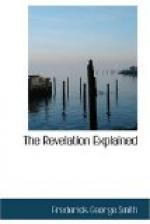The manner in which this important step in the great apostasy was taken and the effects produced thereby is well described in the words of the historian Mosheim (referring to events of the third century), from whom I quote: “In process of time, all the Christian churches of a province were formed into one large ecclesiastical body, which, like confederate states, assembled at certain times, in order to deliberate about the common interests of the whole.... These councils ... changed the whole face of the church, and gave it a new form; for by them the ancient privileges of the people were considerably diminished, and the power and authority of the bishops greatly augmented.... At their first appearance in these general councils, they acknowledged that they were no more than the delegates of their respective churches, and that they acted in the name, and by the appointment of their people. But they soon changed this humble tone, imperceptibly extended the limits of their authority, turned their influence into dominion, and their councils into laws; and openly asserted, at length, that Christ had empowered them to prescribe to his people, authoritative rules of faith and manners.... The order and decency of these assemblies required that some one of the provincial bishops met in council, should be invested with a superior degree of power and authority; and hence the rights of metropolitans derive their origin.”—Church History, Cent. II, Part 2.
When a usurping clergy grasps the power to prescribe “authoritative rules of faith and manners,” to employ the words of Mosheim, we may well conceive that the true amount of pure spiritual food was exceedingly small and could be procured only at starvation rates. He who reads the ecclesiastical events of the third century will find it only too true that many of the cardinal virtues of apostolic Christianity were almost lost sight of and that a great spiritual famine existed in the earth over which this dark horseman of the third seal careered. Instead of salvation through the Spirit of God being carefully taught, baptismal regeneration was exalted, and the people were instructed in the saving virtues of the eucharist. The Platonic idea concerning sin having its seat in the flesh was adopted, and therefore perfect victory or sanctification was made to consist in the mortification of the natural appetites and desires of the body, with the result that a life of fasting, celibacy, or self-inflicted torture was looked upon as the surest means of obtaining the favor of Heaven. The writings of such eminent church Fathers as Tertullian, Origen, Cyprian and others now lying before me, contain the surest evidences of the woeful extent to which this dark cloud of superstition and error had settled down over the world during the period of which I write.
7. And when he had opened
the fourth seal, I heard the voice of
the fourth beast say, Come
and see.




